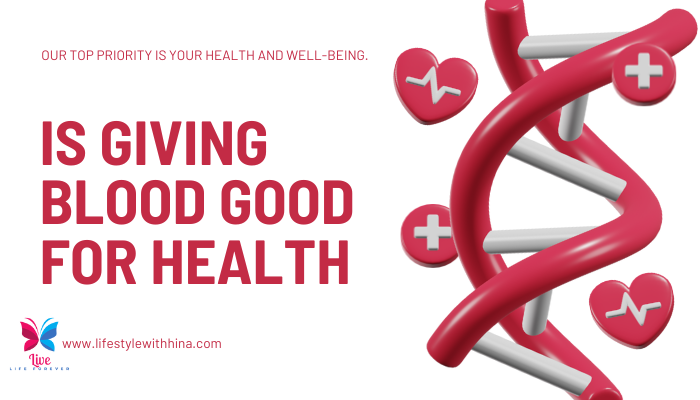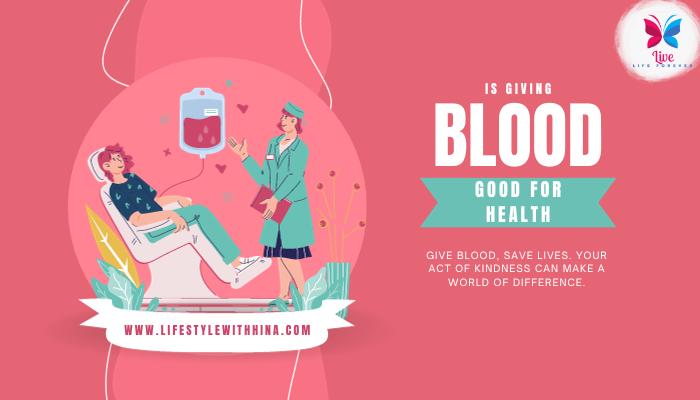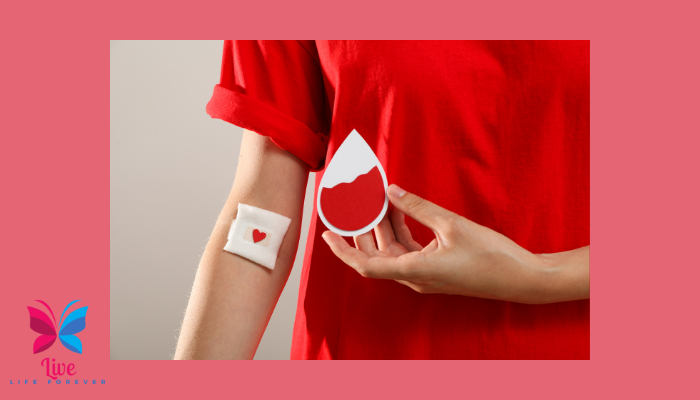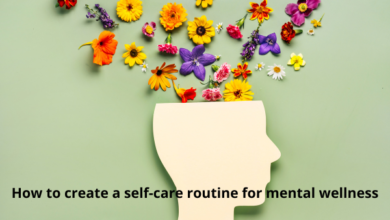Is Giving Blood Good for Health? The Surprising Benefits of Being a Blood Donor

Is Giving Blood Good for Health? The Surprising Benefits of Being a Blood Donor

Is Giving Blood Good for Health?
Giving blood is a selfless act that saves lives. Blood transfusions are critical for surgeries, cancer treatments, chronic illnesses, and traumatic injuries. With no substitute for human blood, donations are essential to maintain our health system. But did you know that rolling up your sleeve also provides personal health benefits?
In this comprehensive guide, learn how blood donation impacts your physical and mental wellbeing. We’ll address common questions, dive into the latest research, and provide actionable tips to incorporate this altruistic habit into your routine.
Overview: How Blood Donation Works
Before outlining the positives, let’s review the blood donation process mandated by the FDA.
You can donate:
- Whole blood – most common – around 1 pint
- Power red – 2 pints using an apheresis machine
- Platelets – the clotting component via apheresis
- Plasma – the liquid portion via apheresis
VDH guidelines require donor eligibility screening for:
- Age and weight minimums
- Certain medications use
- Disease risks like hepatitis
- Travel to certain countries
- Recent tattoos and piercings
- Pregnancy and breastfeeding status
If you qualify and pass the physical examination:
- Registration
- Medical history and mini-physical
- Donation (between 8-10 minutes)
- Refreshment to regain fluid and glucose levels
Then the real magic happens behind the scenes. Your blood:
- Gets tested for infectious diseases like HIV and hepatitis
- Separated into components (as needed) like platelets, plasma, and red blood cells
- Distributed to hospitals
Seems simple enough, right? Now let’s unpack the ways that one pint from your arm can do more than save lives!
The Physical Benefits of Blood Donation
Beyond life-saving transfusions, research shows blood donation has tangible positive impacts. It’s like giving your circulation and overall vitality a tune-up!
1. Donating Blood Burns Calories
Giving blood burns 650 calories for every pint donated. The process itself, plus generating new blood and fluid afterwards, increases your metabolism.
This equates to one hour of jogging!
2. It Reduces Risk of Hemochromatosis
Too much iron in your blood causes hemochromatosis. This condition severely damages the liver, heart, joints, and more if untreated.
Frequent blood donation helps maintain iron at healthy concentrations, reducing odds of this disease up to 90% in some populations.
3. Donation Improves Heart Health
A landmark study followed blood donors for 10 years, finding reduced rates of heart attacks and strokes compared to non-donors.
Researchers propose that donating might support cardiovascular function and blood flow.
4. It Has Anti-Aging Effects
As we age, high iron also increases inflammation and cell damage that spur diseases. However, donating may inhibit these effects to promote longevity.
By reducing iron stores through donation, adults can suppress age-related health declines.
5. Your Body Replenishes Fluid Levels
Donating plasma or platelets via apheresis even removes extra fluid and protein. This prompts your spleen to release stored red blood cells and regenerate plasma.
In healthy individuals, normal volumes are regained within 24-48 hours.
The best part? Many of these gains grow each time you donate since they prompt your body to fully recreate itself!
Now let’s shift gears towards the mental and societal benefits…
Blood Donation Benefits Your Mind and Community
Blood donation also makes a significant difference for communities and even enhances mental health. It offers an easy, yet powerful way to give back and care for each other.
6. Donating Blood Reduces Stress
Research reveals that helping others lowers anxiety, enhances mood, and reduces overall stress levels.
These benefits stem from social connection and release of calming hormones when you give. This is an easily-accessible way to tap into these gains.
7. It Boosts Overall Wellbeing
Similarly, research found that blood donors scored higher on wellbeing assessments across cultures.
Beyond just feeling good hormones when you donate, people also gain a sense of purpose and connection from fulfilling this critical need.
8. Donation Supports Your Community’s Resilience
Severe injuries leading to massive blood loss increase nearly 8-fold for each mile farther from a trauma center. Maintaining an adequate local blood supply saves lives.
Routine donation ensures your community has enough inventory to handle everyday needs and emergencies. It only takes one hour with immense returns.
9. It Advances Medical Research
After using what’s needed, leftover vials help scientists make discoveries! Blood samples provide invaluable insights about genetics, disease monitoring, new drug development, and more.
Cells in a test tube can unlock revolutionary findings to propel medicine forward.
So beyond the bag itself, each donation has cascading benefits for individuals and communities.

Answering Common Concerns About Giving Blood
Despite the benefits, many still feel hesitant about donating blood. Reviewing typical concerns can help put common fears to rest:
Does it hurt?
The actual donation should not hurt. You may feel a pinch comparable to removing a bandaid when the needle goes in. Tell staff if you feel pain so they can adjust. Mostly it just feels like pressure.
Are there risks from donating?
Blood donation has an excellent safety record. Only 1 in 8 donation attempts face even minor adverse reactions like bruising. Serious issues like nerve damage are exceptionally rare at 1 in 250,000.
You cannot get diseases from donated equipment either. Needles and bags are sterile one-time use only. Many precautions protect both donors and recipients.
Can donation make you sick or weak?
Healthy individuals generally tolerate blood donation well. Drink plenty of non-caffeinated fluids beforehand to be at your best. Avoid heavy exercise and alcohol for 24 hours after. Listen to your body and rest if needed.
Within days your counts rebound since bone marrow ramps up production. Your body also absorbs some iron from food easier for up to 6 weeks afterwards to recoup stores.
Will they take too much?
For whole blood, generally only ~10% is drawn – just 1 pint out of 10-12 total. This small volume is quickly regenerated in healthy people.
Automated apheresis machines only remove platelets or plasma, while returning your valuable red blood cells. Staff also monitor you and can halt anytime.
What about infections, medications, or travel?
You will complete screening so staff can determine your eligibility safely each time. Many factors like infections increase temporary deferrals, while resolved conditions can still allow you to donate later on. Medications and travel are assessed individually for risks.
When in doubt, ask! The worst they can say is “not today,” and they’ll clarify when you can return. Staying informed helps make future donations smooth.
Keep in mind policies aim to protect recipients with weakened immune systems, not because donating itself is inherently dangerous for you if you are medically eligible.
Tips to Incorporate Blood Donation Into Your Routine
Hopefully learning all the positives has inspired you! Here are 5 tips to seamlessly incorporate blood donation into your schedule:
1. Find Your Frequency
- Whole blood: Every 56 days for men; every 90 days for women
- Power red: Every 112 days
- Platelets: Up to 24 times per year
- Plasma: Every 28 days
Note more individuals can safely donate plasma and platelets due to shorter intervals. This makes you extra valuable!
2. Stay Hydrated and Well Fed
Drink plenty of fluids 24 hours beforehand and avoid heavy exercise 12 hours prior. Have a filling meal before heading in with protein and complex carbs. This prevents feeling lightheaded afterwards.
3. Make it a Habit
One study found that nearly 80% of new donors do not return within the next year. Consistency saves more lives!
Schedule your next appointment immediately and put it on your calendar. Consider coordinating with your partner’s schedule or turning it into a bi-annual ritual.
4. Bring Entertainment
Between paperwork and post-donation monitoring, allow 1-1.5 hours for your appointment. Bring music, videos, work, or a book to make your time fly by!
5. Ask About Special Programs
Many organizations offer rewards to encourage routine donations. Perks like gift cards, points, free movies, and T-shirts promote loyalty. See what donor clubs or referral bonuses are available in your area to defray costs.
The Bottom Line: Should You Donate Blood?
Blood donation is generally extremely low risk and saves lives through an easy, transient commitment. Plus you gain numerous personal wellness benefits that accumulate from making it a habit!
Beyond feeling good hormones when you donate initially, consider the long term advantages:
- Burning calories
- Reducing disease
- Supporting heart and brain
- Anti-aging effects
- Fostering community resilience
And cutting-edge research uses blood derivatives to unlock medical breakthroughs.
With all these pros, there are practically no cons to rolling up your sleeves regularly unless you have underlying health conditions. Age and other deferrals are often temporary, so remain committed long-term.
Overall blood donation is a supremely rewarding habit for both physical and mental health while paying life-saving dividends for others. Giving blood boosts both your circulation and community connection!
Start making a world of difference for yourself and others with this selfless ritual. Reach out to local blood banks to schedule your first appointment or find a mobile blood drive near you to start boosting wellness today!




